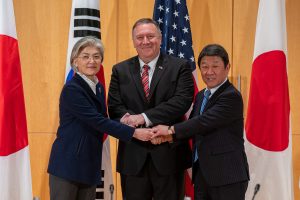Japanese Foreign Minister Toshimitsu Motegi had a busy Saturday in Germany, meeting with his American, South Korean, Chinese, Russian, and Iranian counterparts on the sidelines of the Munich Security Conference.
Motegi met with U.S. Secretary of State Mike Pompeo and South Korean Foreign Minister Kang Kyung-wha in a trilateral meeting, where they discussed cooperation over North Korea’s nuclear weapons program, the new coronavirus outbreak, and security in the Middle East as U.S.-Iran tensions increase. After the trilateral meeting, Motegi had one-on-one talks with Kang, in which both sides agreed to exchange information on the coronavirus outbreak. The issue of compensation for wartime forced laborers and export controls came up, but no progress was made on either of these issues.
In his meeting with Chinese Foreign Minister Wang Yi, Motegi and Wang discussed stepping up preparations for Chinese President Xi Jinping’s state visit, expected for early April. In both the private meeting and public statements, Wang expressed gratitude for Japanese assistance to China in the midst of the coronavirus outbreak. Motegi also thanked Wang for Chinese cooperation in the evacuation of Japanese nationals from Hubei.
Motegi’s meeting with Russian Foreign Minister Sergey Lavrov may lead to the most interesting immediate results, as Japan and Russia agreed to start arrangements for Lavrov to visit Japan. The two sides are planning for Lavrov to visit after a vice minister-level meeting on the proposed conclusion of a peace treaty to formally end the state of war between the two countries. Japan never signed a peace treaty with the then-Soviet Union at the end of World War II. One of the major stumbling blocs to signing a peace treaty has been the ongoing territorial dispute over Russian-held Kuril islands.
Motegi took the opportunity in Munich to spread Japan’s vision of a “Free and Open Indo-Pacific” to an European and global audience, participating in a panel discussion with Dutch Prime Minister Mark Rutte, Indian Minister of External Affairs Subrahmanyam Jaishankar, Australian Minister for Defense Linda Reynolds, and U.S. Senator Robert Menendez. Defense Minister Kono Taro also held meetings with representatives from Canada, Ukraine, France, Germany, the European Union, and NATO.
The Munich Security Conference is, for obvious reasons, usually focused on celebrating the strength of transatlantic ties between allies. This year, it was a forum that brought to sharp relief the growing divergence between the United States and its NATO allies. With most European leaders doubting the strength of the U.S. commitment to its allies and the international community, Pompeo’s speech about tangible U.S. commitments to the continent rang hollow with his audience. Other dominant themes from the conference included China and technology, with U.S. Defense Secretary Mark Esper’s speech setting the anti-China tone of the U.S. delegation.
Japanese coverage of the Munich Security Conference mirrored U.S. coverage, insofar as discussing transatlantic strains and European concerns about the future of the international order. However, in contrast to most U.S. analysts’ concern with the relatively sudden emergence of China as a topic of discussion at Munich, Japan was more interested in how world leaders would address the ongoing coronavirus outbreak and the situation in the Middle East.

































